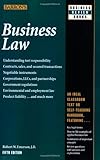You could also consider looking for a legal team member or mentor that could either contribute directly or steer you towards an attorney experienced in this space. As I've said for a while, having a plan for your legal needs is just as important as having one for server infrastructure etc. There are more legal grads than there are legal jobs at present so this might a good time to seek a business-minded cofounder with legal training.
If you're not sure where to start, call the bar association in your state and ask for a referral. You could also consult DIY legal texts such as the NOLO series, which are often quite well written and helpful, but knowing nothing about your business it's very hard to say how well or badly they'd fit your needs. Also, they're mainly aimed at consumers so I don't know if they'll cut it for B2B stuff.
The Small Business Administration has general resources: http://www.sba.gov/category/navigation-structure/starting-ma... or this affordable book provides an excellent introduction to the general principles of business law and the sort of situations any business owner should be prepared to encounter (the whole series is good in fact): http://www.amazon.com/Business-Law-Barrons-Review-Series/dp/...
The law is a very big subject, though. Do you want to get to grips with constitutional law? Or get a bird's eye view on how the law works - which will tell you a bit about all the major areas and how the courts work, but in a very 'reader's digest' fashion with only a paragraph or two about famous cases? Or do you want to know the basics of business law as it might affect your startup? Or do you like the legal philosophy part, only in much greater detail?
1. Constitutional Law http://www.amazon.com/Constitutional-Law-Principles-Policies...
2. Fundamentals of American Law http://www.amazon.com/Fundamentals-American-Law-Alan-Morriso...
3. Barron's Review - Business Law http://www.amazon.com/Business-Law-Barrons-Review/dp/0764142...
4. How Judges think http://www.amazon.com/Judges-Think-Honorable-Richard-Posner/... or Overcoming Law http://www.amazon.com/Judges-Think-Honorable-Richard-Posner/... are excellent books by Judge Richard Posner. Bad Acts, Guilty Minds http://www.amazon.com/Bad-Acts-Guilty-Minds-Conundrums/dp/02... and Ill-gotten Gains http://www.amazon.com/Ill-Gotten-Gains-Evasion-Blackmail-Kin... by Leo Katz examines some philosophically tricky areas of criminal law...although Katz does a better job with the questions than the answers, IMHO.
You will save a fortune by buying used. Especially now, because a lot of law students sell off their books as soon as they've passed the bar exams, which are held around now. It's not important to have the most up-to-date versions; the more current the issues, the more politicized and noisy the discussion. Look in the used books section on Craigslist too. If you ask nicely, your local law school will probably give you a tour of their library or suggest some starter books, likewise your local community college if it offers any courses in law.
Since you're in Seattle, you should also check out the King County Law Library, which is open to the public: http://kcll.org/aboutus/generalinformation/faqs.html finally, the Legal Information Institute at Cornell is a much more useful resource than its bland front page might suggest: http://www.law.cornell.edu/


I don't know about the non-circumvention clause; it sounds like a non-compete which is banned/unenforceable in some jurisdictions but it also sounds like you're in a potential supplier rather than employee relationship here, so labor law considerations don't apply. Geographic exclusivity doesn't sound odd to me at all, and if you don't get the concept then it may be worth your while to take a course in basic business law or buy a book on the subject to get a feel for why it matters and why it would make sense; a distributor who wants rights to particular territory is telling you that that's the scope within which they're able to carry on business effectively, and that they don't want to be liable for problems that might arise when dealing with customers from outside that territory.
In many cases you don't even know for certain where your users are, etc.
You will if you give one of them occasion to sue you and you find yourself summoned to go to their jurisdiction. If this concept is foreign to you, then you definitely need to learn more about it. Here's a book that would give you a cheap-but-decent introduction to business law: http://www.amazon.com/Business-Law-Barrons/dp/0764142402
You should definitely get legal advice; don't make the mistake of thinking that your common sense and skill at logic outweigh centuries of established inter-business legal practice, even though some of the conventions may be counter-intuitive or seem anachronistic.